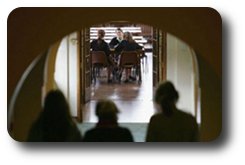Monday 4 October, 6.30pm until 8.30pm, Hamilton House, Mabledon Place, London WC1H 9BD
 Venue: Hamilton House, Mabledon Place, London WC1H 9BD
Venue: Hamilton House, Mabledon Place, London WC1H 9BD
Tickets: £7.50 (£5 concessions) per person. Tickets are available from the Academy of Ideas website.
Parents are doing it for themselves. Well, sort of. Certainly parent power is in vogue in English schools. Education Secretary Michael Gove’s big idea is to back the likes of writer and celebrity parent Toby Young in allowing parents to set up their own ‘free’ schools. It is claimed these will be truly local schools, with boards of governors consisting of parents of children at the school. The New Schools Network already has 450 parent groups on its books from across the social spectrum. This suggests substantial dissatisfaction with the state of British education. Who can blame so many parents for reacting against the previous government’s target culture, factory schooling, its devaluation of subject-based academic learning, the micromanagement of everything from homework to school dinners, dumbed-down examinations and watered-down curriculum? Despite the ‘education, education, education’ rhetoric of New Labour, many parents simply don’t trust the state to educate their offspring. While it’s understandable that parents want to ensure their children get the best schooling possible, opponents of the free schools policy, from teachers’ unions to former education ministers, complain it will divert resources from state provision and that only ‘the sharp-elbowed and better off’ will set up free schools.
Less remarked upon is the possible effect of parent power on teachers’ autonomy. Might pushy parents intervening in the minutiae of school life undermine the authority of teachers? Do mummy and daddy always know best when it comes to judging how children should learn, what should be taught? If parents claim they know what is best educationally for their particular child, where does that leave the ideal of universal access to decent education for all and teachers control in the classroom? Indeed might it foster a climate of mistrust between teachers and parents? Already in state (‘unfree’?) secondary schools from September 2010, parents will have the right to monitor every aspect of their child’s schooling online; every interaction between a pupil and teacher must be recorded and made public. Will such surveillance improve teaching standards or hinder teachers’ freedom in disciplining and teaching the young?
More broadly, what will society’s attitude be to those parents who don’t want to be more involved in their child’s education? Might they be stigmatised as indifferent and irresponsible? What will our attitude be to those children whose parents are not interested in becoming self-trained pedagogues or amateur educational bureaucrats? Might their parents be scapegoated for poor educational attainment? Who will govern the parent governors?
 | Anastasia de Waal director, Family and Education, Civitas; author, Unqualified Success |
 | Sally Millard co-founder, IoI Parents Forum |
 | Fiona Millar columnist, Guardian, co-founder, Local Schools Network |
 | Kevin Rooney politics teacher and head of social science, Queen's School, Bushey; co-author, Who's Afraid Of The Easter Rising? |
 | Siôn Humphreys policy advisor, National Association of Headteachers |
 | Ralph Surman deputy head teacher; chair, Standing Committee for the Education and Training of Teachers |
| Chair: | |

|
Dr Mark Taylor
vice principal, East London Science School; London convenor, IoI Education Forum |
Parents of pupils at a new London academy will soon be able to help decide what their children study.
Anna Davis, Evening Standard, 23 September 2010New types of schools can educate without the burden of bureaucracy
Michael Gove, Daily Telegraph, 2 September 2010The Conservatives have come up with the most controversial manifesto pledge on education, based on a Swedish model that allows parent groups to establish independent schools in the state sector. Anushka Asthana chairs our debate as five experts discuss the value of 'free' schools
Observer, 19 August 2010The 2010 Academies Act might end up giving central government too much power over teachers and schools
Tom Clark, Guardian, 18 August 2010If the government uses the pupil premium to give children eligible for free school meals a voucher worth £10,000 or more, that could transform the life chances of the very poorest children. It is policies like that that will shrink the attainment gap between children of the rich and the poor, not pouring money into shiny new school buildings.
Toby Young, Daily Telegraph blogs, 16 August 2010At times, I think Michael Gove deserves our congratulations. In championing the idea of the
Chris Woodhead, Standpoint, August 2010Asking parents to take over the education system is a bit like asking the prime minister if he's got time to run France as well
Susie Steiner, Guardian, 2 July 2010The left has always been allergic to independence from the state, but in this case it cannot claim that independence means unfairness
Minette Marrin, The Sunday Times, 31 May 2010The new government is pressing ahead with plans which could change the face of schools in England. It talks of
Angela Harrison, BBC, 27 May 2010